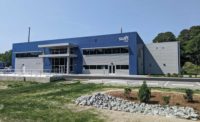South Adams County Water and Sanitation District Pellet Softening/Disinfection Improvements Design
Commerce City, Colo.
Award of Merit - Water/Environment
Award of Merit - Excellence in Safety
BEST PROJECT - Excellence in Sustainability
Submitted By: Carollo Engineers Inc. and Weifield Group Contracting
Owner: South Adams County Water and Sanitation District
Lead Design Firm/Civil, Structural & MEP Engineer: Carollo Engineers Inc.
General Contractor: Moltz Construction Inc.
Architect: Short & Brennan Architects
Startup and Commissioning Consultant: Benjamin Armel
Electrical: Weifield Group Contracting
The 12 alluvial wells that supply the South Adams County Water and Sanitation District’s 66,000 customers produce severely hard water, requiring local homeowners to frequently replace plumbing and water heaters and purchase costly in-home softeners that release corrosive brine waste into the sewer. The softeners also contribute to discharges of high dissolved solids from the district’s wastewater treatment plant.
Mineral pellet softening technology, a proven treatment process in Europe, offered a compact, cost-effective way to rectify the hardness issues and meet the district’s finished water goals. That led to construction of an 18-million-gallon-per-day water softening and filtration plant—the largest facility of its type in the U.S. and the first in the world to utilize load cells to remotely manage pellet size and inventory. The load cells allow the facility to be unattended for half of the day, resulting in lower personnel costs that help reduce customers’ softening rates. In addition, spent pellets can be beneficially reused in a variety of local applications.

Photo by John Ripley
Constructed out of a prefabricated structure at the district’s water treatment facility, the pellet-softening operation’s electrical infrastructure is almost entirely above ground. Advanced modeling technology aided in precisely locating wireway and duct bank locations. To minimize onsite concrete work and accelerate construction, the pellet-softening train’s eight filters were prefabricated inside stainless-steel vessels, then delivered in sequence to limit onsite storage needs. Chemical-feed equipment is positioned on corrosion-minimizing housekeeping pads while valves are located within easy reach of operators.
As the project unfolded at the height of the COVID-19 pandemic, the project team followed strict guidelines to minimize spread of the virus. In addition to social distancing, mask use and smaller crew sizes, the workers received a daily flow chart that included self-diagnosing prompts, temperature records and mandatory steps to be fulfilled before being permitted to remain in the field. Mock accident drills also helped prepare teams for any kind of emergency.

Photo by John Ripley
The construction team offered safety-enhancing practices to be incorporated into plant operations, such as routing softened water plumbing to the calibration columns. This allows clean water to push through the pumps, minimizing operator exposure to hazardous chemicals. All piping and valves are clearly labeled with tagging numbers to simplify and assist in staff training and troubleshooting sessions.

Photo by John Ripley
The new system was constructed with no recordable incidents or lost-time accidents in more than 150,000 staff hours, and with no disruption to the water treatment plant’s operations and services. Once installation was complete, vigilant testing allowed the district to adjust and ultimately increase the filter-loading rate from the original design capacity, eliminating the need to construct two additional filters and creating space for a future pellet-grinding installation.




